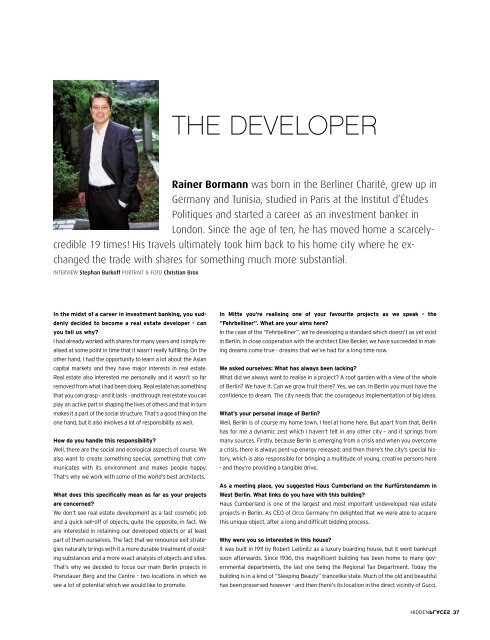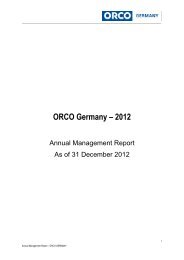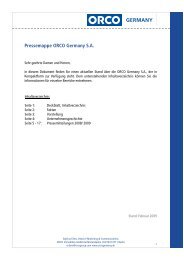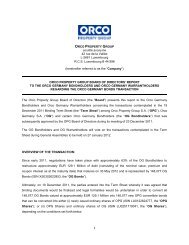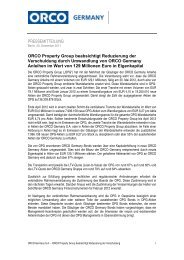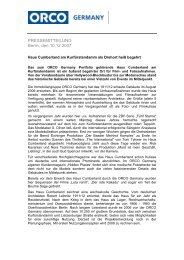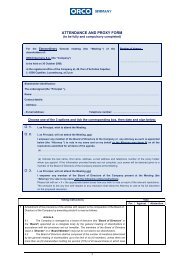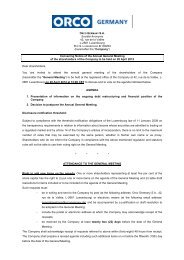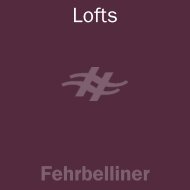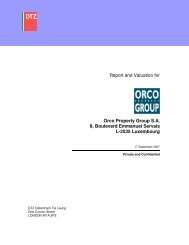Create successful ePaper yourself
Turn your PDF publications into a flip-book with our unique Google optimized e-Paper software.
Rainer Bormann was born in the Berliner Charité, grew up in<br />
<strong>Germany</strong> and Tunisia, studied in Paris at the Institut d’Études<br />
Politiques and started a career as an investment banker in<br />
London. Since the age of ten, he has moved home a scarcelycredible<br />
19 times! His travels ultimately took him back to his home city where he exchanged<br />
the trade with shares for something much more substantial.<br />
INTERVIEW Stephan Burkoff PORTRAIT & FOTO Christian Brox<br />
In the midst of a career in investment banking, you sud-<br />
denly decided to become a real estate developer - can<br />
you tell us why?<br />
I had already worked with shares for many years and I simply re-<br />
alised at some point in time that it wasn‘t really fulfilling. On the<br />
other hand, I had the opportunity to learn a lot about the Asian<br />
capital markets and they have major interests in real estate.<br />
Real estate also interested me personally and it wasn‘t so far<br />
removed from what I had been doing. Real estate has something<br />
that you can grasp - and it lasts - and through real estate you can<br />
play an active part in shaping the lives of others and that in turn<br />
makes it a part of the social structure. That‘s a good thing on the<br />
one hand, but it also involves a lot of responsibility as well.<br />
How do you handle this responsibility?<br />
Well, there are the social and ecological aspects of course. We<br />
also want to create something special, something that com-<br />
municates with its environment and makes people happy.<br />
That‘s why we work with some of the world‘s best architects.<br />
What does this specifically mean as far as your projects<br />
are concerned?<br />
We don‘t see real estate development as a fast cosmetic job<br />
and a quick sell-off of objects, quite the opposite, in fact. We<br />
are interested in retaining our developed objects or at least<br />
part of them ourselves. The fact that we renounce exit strate-<br />
gies naturally brings with it a more durable treatment of exist-<br />
ing substances and a more exact analysis of objects and sites.<br />
That‘s why we decided to focus our main Berlin projects in<br />
Prenzlauer Berg and the Centre - two locations in which we<br />
see a lot of potential which we would like to promote.<br />
ThE DEVELOPER<br />
In Mitte you‘re realising one of your favourite projects as we speak - the<br />
“Fehrbelliner”. What are your aims here?<br />
In the case of the “Fehrbelliner”, we‘re developing a standard which doesn‘t as yet exist<br />
in Berlin. In close cooperation with the architect Eike Becker, we have succeeded in mak-<br />
ing dreams come true - dreams that we‘ve had for a long time now.<br />
We asked ourselves: What has always been lacking?<br />
What did we always want to realise in a project? A roof garden with a view of the whole<br />
of Berlin? We have it. Can we grow fruit there? Yes, we can. In Berlin you must have the<br />
confidence to dream. The city needs that: the courageous implementation of big ideas.<br />
What’s your personal image of Berlin?<br />
Well, Berlin is of course my home town. I feel at home here. But apart from that, Berlin<br />
has for me a dynamic zest which I haven‘t felt in any other city – and it springs from<br />
many sources. Firstly, because Berlin is emerging from a crisis and when you overcome<br />
a crisis, there is always pent-up energy released; and then there‘s the city‘s special his-<br />
tory, which is also responsible for bringing a multitude of young, creative persons here<br />
- and they‘re providing a tangible drive.<br />
As a meeting place, you suggested Haus Cumberland on the Kurfürstendamm in<br />
West Berlin. What links do you have with this building?<br />
Haus Cumberland is one of the largest and most important undeveloped real estate<br />
projects in Berlin. As CEO of Orco <strong>Germany</strong> I‘m delighted that we were able to acquire<br />
this unique object, after a long and difficult bidding process.<br />
Why were you so interested in this house?<br />
It was built in 1911 by Robert Leibnitz as a luxury boarding house, but it went bankrupt<br />
soon afterwards. Since 1936, this magnificent building has been home to many gov-<br />
ernmental departments, the last one being the Regional Tax Department. Today the<br />
building is in a kind of “Sleeping Beauty” trancelike state. Much of the old and beautiful<br />
has been preserved however - and then there‘s its location in the direct vicinity of Gucci,


